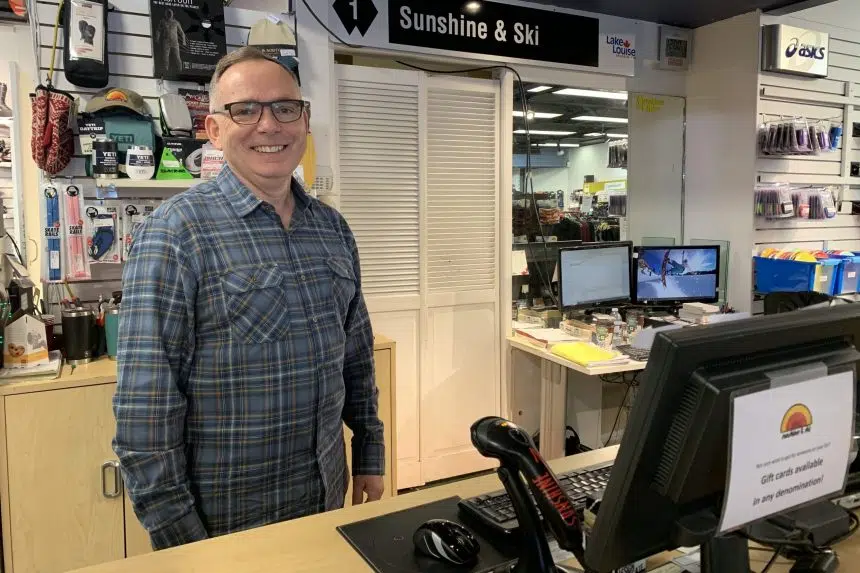As people embrace the last shopping weekend before Christmas, a local retailer is hoping they keep small businesses in mind.
Brian Sampson has owned and operated Sunshine and Ski in Regina since 1980.
Since then, the store has provided jobs for him and his wife, along with their four children.
“This is our livelihood,” he said. “This is the staple of our income and our ability to connect with Regina.”
Being a winter apparel and sports equipment seller, Sampson said it’s common to have sales take a hit every so often due to the turbulent Saskatchewan weather. However, more recently, online shopping has been an added factor.
And Sampson isn’t alone.
According to a new survey out by the Canadian Federation of Independent Business (CFIB), showrooming — the act of walking into a store, using an employee’s expertise or checking out a product and then purchasing it online — is hurting independent retailers.
Out of 1,370 businesses the CFIB surveyed across the country last month, 60 per cent said they’ve experienced showrooming, with a third of them saying it’s having a “significant impact” on their bottom lines.
Sampson said his store took the biggest hit about five years ago. In response, it adjusted how it did business.
“We compromised, so, for example, if we had 11 brands of snowboards, we’re now at nine brands,” he explained. “I don’t think it’s that we have the wrong products or retailers are even bringing in the wrong products, it could come simply down to a colour — and that’s when the retailer must say, ‘I have access to that. The website you’re going to is no different than my website.’
“If they outright tell us (they’re shopping online), we have a large-screen desktop and we’ll take you right to the screen and show you that we go to the same supplier. We’ll have you pick and choose and have it delivered to the store, and — if need be — we’ll delivery it to your house.”
Younger generation more likely to showroom, poll finds
A separate poll, co-led by the CFIB and Angus Reid, finds that 55 per cent of shoppers — mostly those between the ages of 18 to 34 — admit to showrooming.
“This is concerning because that age group is the one that’s getting to their peak consumer being; they’re reaching their prime earning years, those prime spending years,” explained Ryan Mallough, the survey’s author and CFIB director of provincial affairs.
“We are concerned to see that not only does it seem to be a problem but the younger generation that’s coming up seems to be the ones who are doing it.”
Regina resident Jaymin Patel is a part of that generation and admits he showrooms all the time.
“I want to get knowledge about the products and the price, and then I will try online,” he said. “I think that online is cheaper.”
Alexis Orlowski shares the same age group and also prefers to shop on the Internet, noting it’s mostly for the convenience.
“I don’t have to leave my house; it comes to me. I don’t have to be in line, I don’t have to be with people or run into people,” she said with a chuckle.
However, Orlowski added she doesn’t see a point in showrooming.
“At that point, if I’m in the store, I may as well just buy it,” she said.
On the other hand, Cassidy Murphy does the opposite of showrooming; she prefers to look online first and then purchase in a store.
“I like looking online, but I don’t buy online because I never really know what I’m going to get,” she said. “Why not just buy it in-store? First of all, online you’re going to spend money on shipping. Second of all, you don’t know if it’s going to come the way you tried it on — and shop local, support everyone.”
Educating staff, consumers is key, says local retailer
Having owned a business for decades, Sampson said showrooming is just a sign of the times and it’s up to retailers to keep up.
“I believe online has its place — a very important part,” he said. “We used to say you’d shop our store three times before making a decision. We don’t have that anymore. People come in, they’ve done their research and I think online has done a good job that way.
“My worry, though, is that you need brick and mortar — you need that car dealership, you need that furniture store, you need those buildings with people.”
Throughout his survey research, Mallough said he heard similar sentiments from other local businesses.
He noted this holiday season the CFIB is asking shoppers to “go beyond the price point” and see the value that spending money locally brings, as opposed to supporting Internet retail giant Amazon, for instance.
“Amazon does not pay property taxes, they do not pay for those community services, they’re not sponsoring the local sports team or repairing the church roof when they need it,” he explained. “If you keep pulling your dollars out of small businesses, not only will you have empty shop fronts but, ultimately, your community is going to suffer for it.”
Moving forward, Sampson emphasized that it’s up to business owners to teach their customers about the impact of online shopping.
“It’s educating our staff, educating the consumer,” he said. “If I have a conversation with someone, I’ll say to them, ‘Take your job that you have right now. If technology were to replace your job, you would not have the money to go shop. You’ve got to be careful; there’s got to be a balance between what you need and when you need it, and can online help you or can a local retailer help you? Think of your own position at your own job and if technology replaced you, I mean, that’s basically what you’re saying you want technology to do when you shop online.’ “











